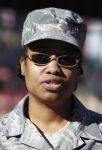ST. LOUIS (AP)—Looking around at the tens of thousands of people waving American flags and cheering, Army Maj. Rich Radford was moved that so many braved a cold January wind Saturday in St. Louis to honor people like him: Iraq War veterans.
The parade, borne out of a simple conversation between two St. Louis friends a month ago, was the nation’s first big welcome-home for veterans of the war since the last troops were withdrawn from Iraq in December.
 |
| PROUD VET—Gayla Gibson, a 38-year-old Air Force master sergeant, waits in a staging area before the start of a parade to honor Iraq War veterans Jan. 28, 2012, in St. Louis. (AP Photo/Jeff Roberson)
|
“It’s not necessarily overdue, it’s just the right thing,” said Radford, a 23-year Army veteran who walked in the parade alongside his 8-year-old daughter, Aimee, and 12-year-old son, Warren.
Radford was among about 600 veterans, many dressed in camouflage, who walked along downtown streets lined with rows of people clapping and holding signs with messages including “Welcome Home” and “Thanks to our Service Men and Women.” Some of the war-tested troops wiped away tears as they acknowledged the support from a crowd that organizers estimated reached 100,000 people.
Fire trucks with aerial ladders hoisted huge American flags in three different places along the route, with politicians, marching bands—even the Budweiser Clydesdales—joining in. But the large crowd was clearly there to salute men and women in the military, and people cheered wildly as groups of veterans walked by.
That was the hope of organizers Craig Schneider and Tom Appelbaum. Neither man has served in the military but came up with the idea after noticing there had been little fanfare for returning Iraq War veterans aside from gatherings at airports and military bases. No ticker-tape parades or large public celebrations.
“It was an idea that nobody said no to,” he said. “America was ready for this.”
All that effort by her hometown was especially touching for Gayla Gibson, a 38-year-old Air Force master sergeant, who said she spent four months in Iraq—seeing “amputations, broken bones, severe burns from IEDs”—as a medical technician in 2003.
“I think it’s great when people come out to support those who gave their lives and put their lives on the line for this country,” Gibson said.